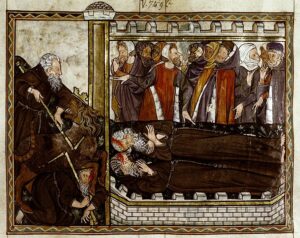Here we come to a dramatic turning point in the narrative (including a change of tense). Whose is the “great voice from Heaven” that calls out “Come up here”? We are not told. Even the phrase “spirit of life from God” does not mean that God raised up the two martyrs but only that it was God’s spirit that entered into them: the author uses a different expression when he wants to convey the idea of God directly acting. Who, exactly, “saw them” and reacted in fear is also left vague.
Readers who think the two witnesses are a kind of latter-day Moses figure run into the problem that there was no Jewish tradition — neither biblical nor in Josephus nor Philo — that Moses was bodily resurrected.
One would presume that the voice from heaven was God speaking but that interpretation is not certain. Revelation refers to other heavenly voices that do not belong to God.
It is also odd that we read nothing further here about the beast from the abyss that had just killed the two “witnesses” or “martyrs”. It is as if he is no longer at the scene to witness the sudden turn of events and the ascension to heaven.

One more oddity: only in this passage in Revelation do enemies of God give glory to God as a result of witnessing or experiencing calamitous events like an earthquake or plague or other catastrophe. In every other such scenario they respond with intensified anger.
Such are the difficulties that concern us but we must ask if they would also have troubled the original readers. Would the first audiences have understood exactly who and what was being described?
Sit back (or forward if you prefer to concentrate) and observe the following case for Revelation‘s two witnesses being an adaptation of another Jewish source document. And prepare to meet a new character in one of the stories, the virgin Tabitha who gruesomely has her blood sucked from her.
After this journey we will return to the above resurrection and ascension passage and examine it afresh.
Analysis of Revelation 11:3-13
The first question Thomas Witulski [W] explores is whether the author was creating a new narrative entirely from his imagination or whether he was re-working a “tradition” known to him. To answer that question W compares 11:3-13 with two similar accounts: the Apocalypse of Elijah and a chapter by the church father Lactantius in Divine Institutes. Can these works be shown to depend on Revelation 11 or do they indicate the existence of an earlier account that we can say was also available to the author of Revelation?
Apocalypse of Elijah (see the earlywritings site for views on date and provenance: W notes it belongs to the second half of the third century CE)
The relevant passage:
My blood [that is the blood of an earlier mentioned virgin named Tabitha] you have thrown on the temple has become the salvation of the people.
Then, when Elijah and Enoch hear that the Shameless One has appeared in the holy place, they will come down to fight against him, saying,
…
The Shameless One will hear and be furious, and he will fight with them in the market-place of the great city; and he will spend seven days fighting with them. And they will lie dead in the market-place for three and a half days; and all the people will see them. But on the fourth day they will arise and reproach him, saying
…
The Shameless One will hear and be furious and fight with them; and the whole city will gather round them. On that day they will shout aloud to heaven, shining like the stars, and all the people and the whole world will see them. The Son of Lawlessness will not prevail over them.
He will vent his fury on the land
…
(From The Apocryphal Old Testament edited by H.F.D. Sparks)
In both accounts: Continue reading “The Two Witnesses of Revelation 11 – part C”
